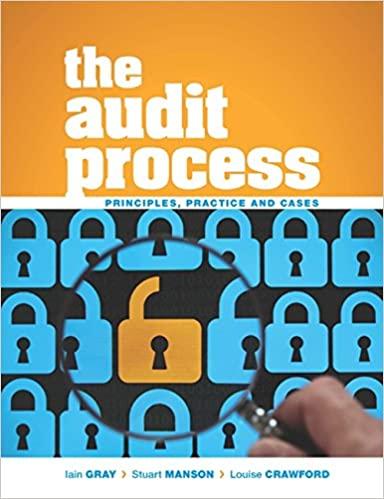Answered step by step
Verified Expert Solution
Question
1 Approved Answer
Choose the correct answer from the options The underlying theme of the conceptual framework is ( E1-PC1) decision usefulness. understandability. faithful representation. comparability. The objective
Choose the correct answer from the options
- The underlying theme of the conceptual framework is (E1-PC1)
- decision usefulness.
- understandability.
- faithful representation.
- comparability.
- The objective of financial reporting in the International Accounting Standards Boards (IASBs) Conceptual Framework (E1-PC1)
- Is the foundation for the Framework.
- Includes the qualitative characteristics that make accounting information useful.
- Is found on the third level of the Framework.
- All of the choices are correct regarding the objective of financial reporting.
- The second level in the International Accounting Standards Boards (IASBs) Conceptual Framework (E1-PC1)
- Identifies the objective of financial reporting.
- Identifies recognition, measurement, and disclosure concepts used in establishing and applying accounting standards.
- Provides the elements of financial statements.
- Includes assumptions, principles, and constraints.
- A soundly developed conceptual framework of concepts and objectives should (E1-PC1)
- Increase financial statement users understanding of and confidence in financial reporting.
- Enhance comparability among companies financial statements.
- Allow new and emerging practical problems to be more quickly solved.
- All of these answers are correct.
- What is a purpose of having a conceptual framework? (E1-PC1)
- To make sure that economic activity can be identified with a particular legal entity.
- To segregate activities among competing companies.
- To provide comparable information for different companies.
- To enable the profession to more quickly solve emerging practical problems and to provide a foundation from which to build more useful standards.
- The measurement principle includes the (E1-PC4)
- Fair value principle only.
- Historical cost principle only.
- Revenue recognition principle and expense recognition principle.
- Historical cost principle and the fair value principle.
- Which of the following is an argument against using historical cost in accounting? (E1-PC4)
- Fair values are more relevant.
- Historical costs are based on an exchange transaction.
- Historical costs are reliable.
- Fair values are subjective.
- Which of the following is a component of the revenue recognition principle? (E1-PC4)
- Cash is received and the amount is material.
- Recognition occurs when the performance obligation is satisfied.
- Production is complete and there is an active market for the product.
- Cash is realized or realizable and production is complete.
- Recognition of expense related to amortization of an intangible asset illustrates which principle of accounting? (E1-PC4)
- Expense recognition.
- Full disclosure.
- Revenue recognition.
- Historical cost.
- Under International Financial Reporting Standards (IFRS) revenue is recognized (E1-PC4)
- At the time when cash is collected.
- During production.
- At the end of production.
- When the performance obligation is satisfied.
- What would be an advantage of having all countries adopt and follow the same accounting standards? (E2-PC1)
- Consistency.
- Comparability.
- Lower preparation costs.
- Comparability and lower preparation costs
- What is the major objective of financial reporting? (E2-PC1)
- Provide information that is useful to management in making decisions.
- Provide information that clearly portray nonfinancial transactions.
- Provide information that is useful to present and potential equity investors, lenders, and other creditors in making decisions.
- Provide information that excludes claims to the resources.
- The international financial reporting environment includes challenges in financial reporting including all of the following except: (E2-PC1)
- Political environment.
- Expectations gap.
- Decision-usefulness.
- Ethics.
- Who issues International Financial Reporting Standards? (E2-PC2)
- The international auditing practices board
- The international stock exchange
- The international accounting standards board
- Representatives from the governments of each country
- One of the objectives of the International Accounting Standards Committee Foundation is to? (E2-PC2)
- Oversee the standard setting and regulatory process
- Review defective accounts
- Control the accounting profession
- Formulate accounting standards
- An accounting standard is issued after the following consultation procedure has been carried out: (E2-PC2)
- Research, Goes on the IASB agenda, Discussion paper, Exposure draft, adopted by countries,Post implementation review.
- IASC Foundation decide, Discussion Paper, Exposure Draft, adopted by countries, post implementation review.
- IASB decide, Adopted by countries, reviewed after 2 years.
- IASC Foundation, IASB, IFRS issued, reviewed after 2 years.
- IAS 1 deals with: (E2-PC2)
- The presentation of financial statements
- The valuation of inventories
- The disclosures in the statement of cash flows
- Events after the reporting period
- AS 7 deals with: (E2-PC2)
- The presentation of financial statements
- The valuation of inventories
- The disclosures in the statement of cash flows
- Events after the reporting period
choose correct answer from every q
Step by Step Solution
There are 3 Steps involved in it
Step: 1

Get Instant Access to Expert-Tailored Solutions
See step-by-step solutions with expert insights and AI powered tools for academic success
Step: 2

Step: 3

Ace Your Homework with AI
Get the answers you need in no time with our AI-driven, step-by-step assistance
Get Started


